Toyota Proace Transporter vs VW ID. Buzz Bus - Differences and prices compared
Compare performance (150 HP vs 340 HP), boot space and price (31600 £ vs 42900 £) at a glance. Find out which car is the better choice for you – Toyota Proace Transporter or VW ID. Buzz Bus?
Costs and Efficiency:
Price and efficiency are key factors when choosing a car – and this is often where the real differences emerge.
Toyota Proace Transporter has a noticeable advantage in terms of price – it starts at 31600 £, while the VW ID. Buzz Bus costs 42900 £. That’s a price difference of around 11220 £.
In terms of energy consumption, the advantage goes to the VW ID. Buzz Bus: with 19 kWh per 100 km, it’s distinct more efficient than the Toyota Proace Transporter with 23.80 kWh. That’s a difference of about 4.80 kWh.
As for range, the VW ID. Buzz Bus performs distinct better – achieving up to 485 km, about 136 km more than the Toyota Proace Transporter.
Engine and Performance:
Under the bonnet, it becomes clear which model is tuned for sportiness and which one takes the lead when you hit the accelerator.
When it comes to engine power, the VW ID. Buzz Bus has a decisively edge – offering 340 HP compared to 150 HP. That’s roughly 190 HP more horsepower.
In acceleration from 0 to 100 km/h, the VW ID. Buzz Bus is clearly quicker – completing the sprint in 6.10 s, while the Toyota Proace Transporter takes 12.10 s. That’s about 6 s faster.
In terms of top speed, the Toyota Proace Transporter performs barely noticeable better – reaching 170 km/h, while the VW ID. Buzz Bus tops out at 160 km/h. The difference is around 10 km/h.
There’s also a difference in torque: VW ID. Buzz Bus pulls convincingly stronger with 679 Nm compared to 370 Nm. That’s about 309 Nm difference.
Space and Everyday Use:
Whether family car or daily driver – which one offers more room, flexibility and comfort?
Seats: Toyota Proace Transporter offers a bit more seating capacity – 6 vs 5.
In curb weight, Toyota Proace Transporter is convincingly lighter – 1656 kg compared to 2400 kg. The difference is around 744 kg.
In maximum load capacity, the Toyota Proace Transporter performs clearly better – up to 6600 L, which is about 4395 L more than the VW ID. Buzz Bus.
When it comes to payload, Toyota Proace Transporter decisively takes the win – 1323 kg compared to 600 kg. That’s a difference of about 723 kg.
Who comes out on top?
Overall, the VW ID. Buzz Bus shows itself to be leaves the rival little chance and secures the title of DriveDuel Champion.
It convinces with the more balanced overall package and proves to be the more versatile choice for everyday use.
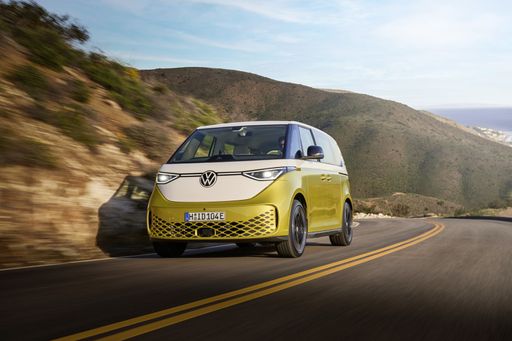
VW ID. Buzz Bus
Costs and Consumption
View detailed analysis
Engine and Performance
View detailed analysis
Dimensions and Body
View detailed analysis
Toyota Proace Transporter
The Toyota Proace Transporter is a no-nonsense work van that pairs Toyota’s dependable reputation with smart practicality, so you can load, drive and finish the job without unnecessary drama. It won’t win design awards, but with a comfortable cab, sensible feature set and a focus on getting things done, it quietly keeps fleets and small businesses smiling.
detailsVW ID. Buzz Bus
The VW ID. Buzz revives the classic camper van vibe with a modern electric twist, offering plush space and a friendly, futuristic face that stops traffic. It’s clearly built for weekend escapes and city runs alike, with clever interior details that make it as practical as it is charming.
details
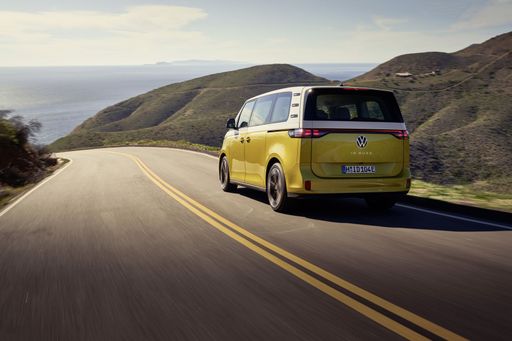
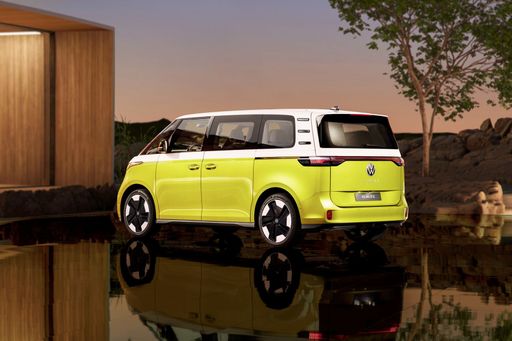
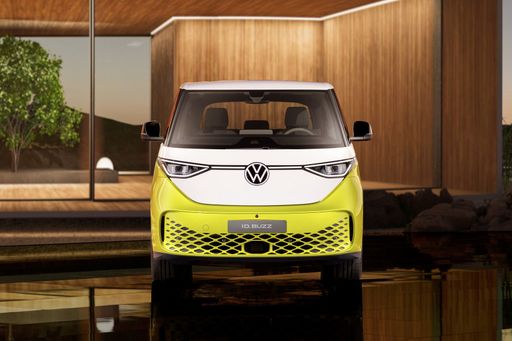
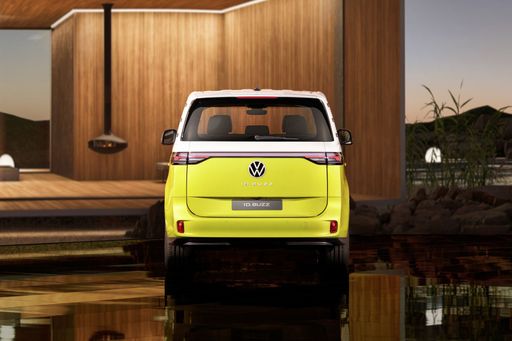
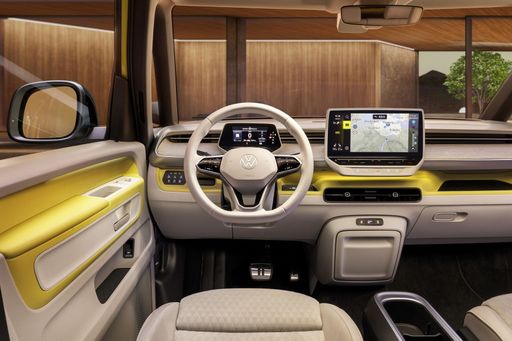
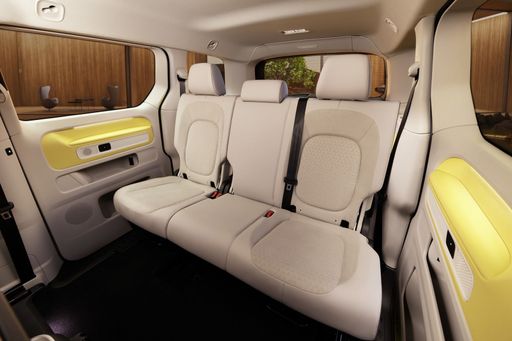
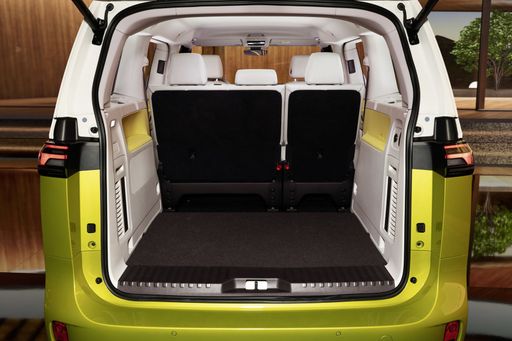
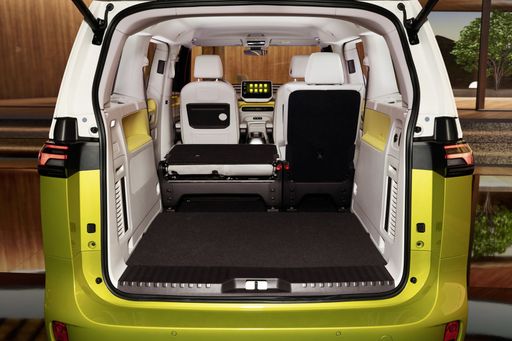

|
|
|
|
|
Costs and Consumption |
|
|---|---|
|
Price
31600 - 51000 £
|
Price
42900 - 64200 £
|
|
Consumption L/100km
6.4 - 6.7 L
|
Consumption L/100km
-
|
|
Consumption kWh/100km
23.8 - 23.9 kWh
|
Consumption kWh/100km
19 - 20.6 kWh
|
|
Electric Range
221 - 349 km
|
Electric Range
329 - 485 km
|
|
Battery Capacity
-
|
Battery Capacity
59 - 86 kWh
|
|
co2
0 - 177 g/km
|
co2
0 g/km
|
|
Fuel tank capacity
69 L
|
Fuel tank capacity
-
|
Dimensions and Body |
|
|---|---|
|
Body Type
Cargo Van
|
Body Type
Bus
|
|
Seats
3 - 6
|
Seats
5
|
|
Doors
4 - 5
|
Doors
5
|
|
Curb weight
1656 - 2100 kg
|
Curb weight
2400 - 2780 kg
|
|
Trunk capacity
-
|
Trunk capacity
1121 - 1340 L
|
|
Length
4980 - 5330 mm
|
Length
4712 - 4962 mm
|
|
Width
1920 mm
|
Width
1985 mm
|
|
Height
1895 - 1935 mm
|
Height
1924 - 1927 mm
|
|
Max trunk capacity
3200 - 6600 L
|
Max trunk capacity
2205 L
|
|
Payload
955 - 1323 kg
|
Payload
462 - 600 kg
|
Engine and Performance |
|
|---|---|
|
Engine Type
Electric, Diesel
|
Engine Type
Electric
|
|
Transmission
Automatic, Manuel
|
Transmission
Automatic
|
|
Transmission Detail
Reduction Gearbox, Manual Gearbox, Automatic Gearbox
|
Transmission Detail
-
|
|
Drive Type
Front-Wheel Drive
|
Drive Type
Rear-Wheel Drive, All-Wheel Drive
|
|
Power HP
120 - 150 HP
|
Power HP
170 - 340 HP
|
|
Acceleration 0-100km/h
12.1 - 13.3 s
|
Acceleration 0-100km/h
6.1 - 10.7 s
|
|
Max Speed
130 - 170 km/h
|
Max Speed
145 - 160 km/h
|
|
Torque
260 - 370 Nm
|
Torque
310 - 679 Nm
|
|
Number of Cylinders
4
|
Number of Cylinders
-
|
|
Power kW
88 - 110 kW
|
Power kW
125 - 250 kW
|
|
Engine capacity
1499 - 2184 cm3
|
Engine capacity
-
|
General |
|
|---|---|
|
Model Year
2024 - 2025
|
Model Year
2024
|
|
CO2 Efficiency Class
A
|
CO2 Efficiency Class
A
|
|
Brand
Toyota
|
Brand
VW
|
Is the Toyota Proace Transporter offered with different drivetrains?
Available configurations include Front-Wheel Drive.
The prices and data displayed are estimates based on German list prices and may vary by country. This information is not legally binding.
